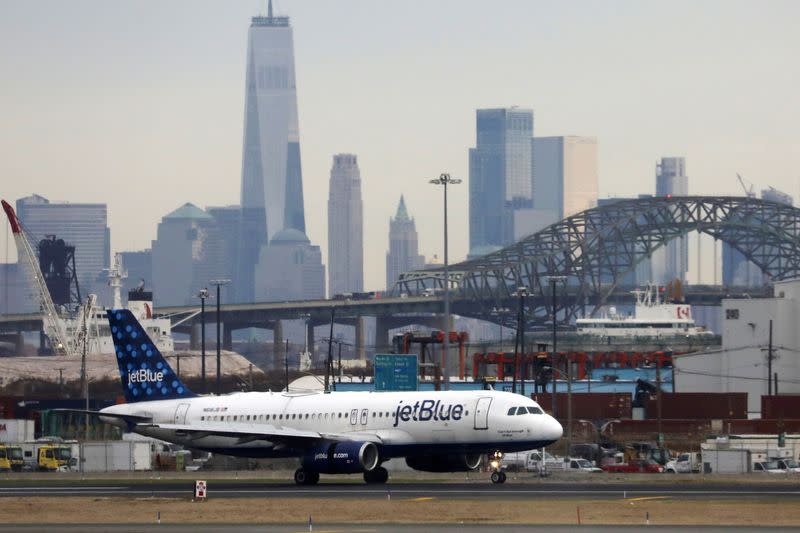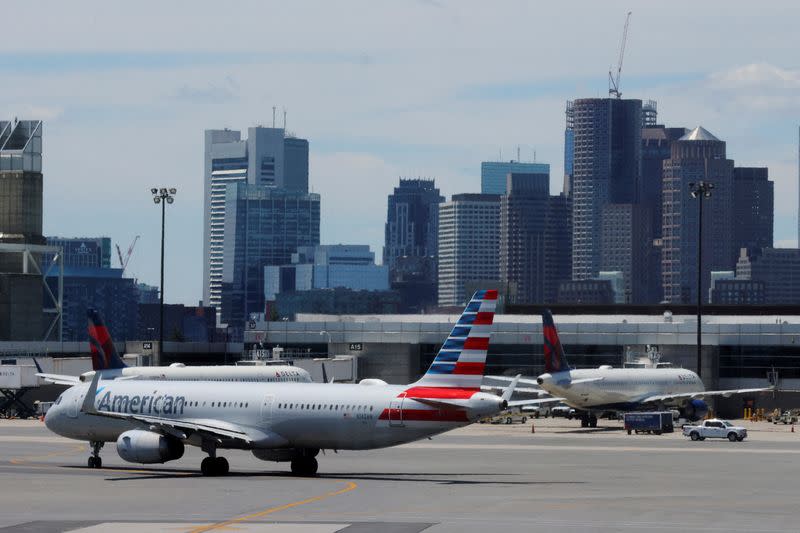U.S. challenges American Airlines-JetBlue alliance as antitrust trial begins
By Nate Raymond, David Shepardson and Diane Bartz
BOSTON (Reuters) -The U.S. Justice Department on Tuesday urged a judge to force American Airlines and JetBlue Airways to scrap their U.S. Northeast partnership because it would mean higher prices for consumers.
Even as JetBlue Chief Executive Robin Hayes defended the pact as "pro-consumer" from the witness stand, lawyers with the Biden administration, six states and the District of Columbia urged a Boston federal judge to break it up 18 months after it launched.
Justice Department attorney William Jones said the Northeast Alliance is a "de facto merger" of their Boston and New York operations that allowed them to coordinate flights and pool revenue to the detriment of travelers, who face an additional $700 million in annual additional costs.
But Hayes, the first witness, rejected a Justice Department lawyer's suggestion that what American got from the alliance "was JetBlue in their pocket," echoing a phrase the CEO used in a text message after discussing American's previous partnership proposal with an unidentified airline that did not go ahead.
The first day of the trial veered into JetBlue's plan to buy low cost rival Spirit, when Justice Department attorney John Davis repeatedly pressed Hayes on whether competition with Spirit forced JetBlue to offer lower prices.
Hayes, testifying under oath, demurred more than once, prompting Davis to assert he was not answering the question.
"Sometimes we will react to what they're doing. Sometimes they will react to what we're doing," Hayes finally said.
JetBlue's proposed deal for Spirit is expected to face a tough antitrust review. Hayes defended the acquisition from the witness stand, saying it would create "one of the most powerful, disruptive forces that this country has seen."
The Justice Department has said that the Northeast Alliance eliminates incentives for American to cut prices to lure customers from JetBlue, a historically disruptive rival with often lower fares. It also gives the airlines a more than 80% market share in flights from Boston to Washington and six other airports.
In opening arguments, lawyers for the airlines argued that contrary to the Justice Department's hypothetical claims of harm, the Northeast Alliance has produced significant real-word increases in flights and capacity since its unveiling in 2020.
They argued the alliance allowed them to become a viable competitor to dominant Delta Air Lines and United Airlines operating out of Boston and John F. Kennedy, LaGuardia and Newark airports in the New York region.
"More output like we're seeing here is highly competitive and leads to lower fares," Richard Schwed, JetBlue's lawyer, told U.S. District Judge Leo Sorokin.
The three-week trial opened after a week in which U.S. judges ruled against the government in two antitrust fights: sugar and insurance. The Justice Department and the states sued over the Northeast Alliance in September 2021.
Airline mergers in recent years have led to a highly consolidated industry, in which American, Delta, United and Southwest Airlines control over 80% of domestic travel, the government argues.
(Reporting by Nate Raymond in Boston and Diane Bartz and David Shepardson in Washington; Editing by Marguerita Choy, Jonathan Oatis, David Gregorio and Richard Chang)

 Yahoo Finance
Yahoo Finance 

